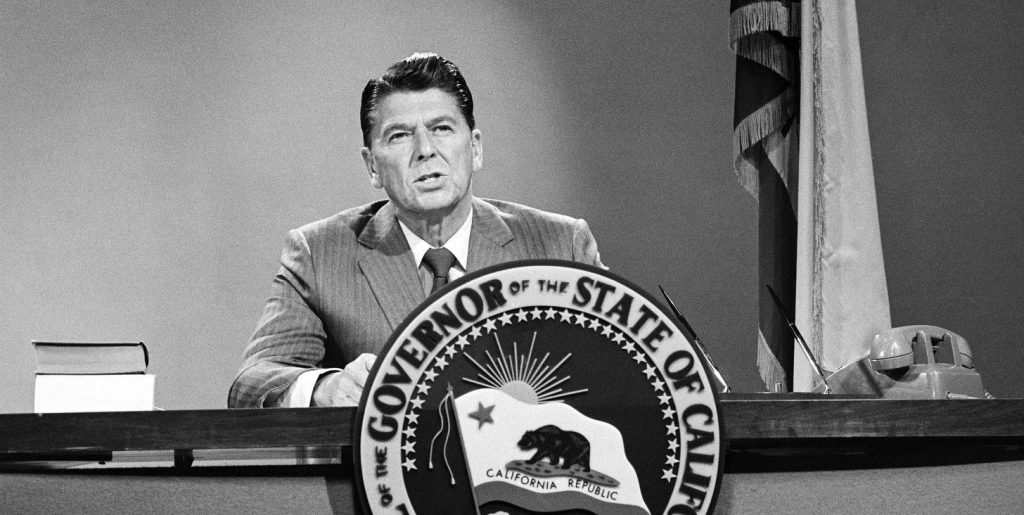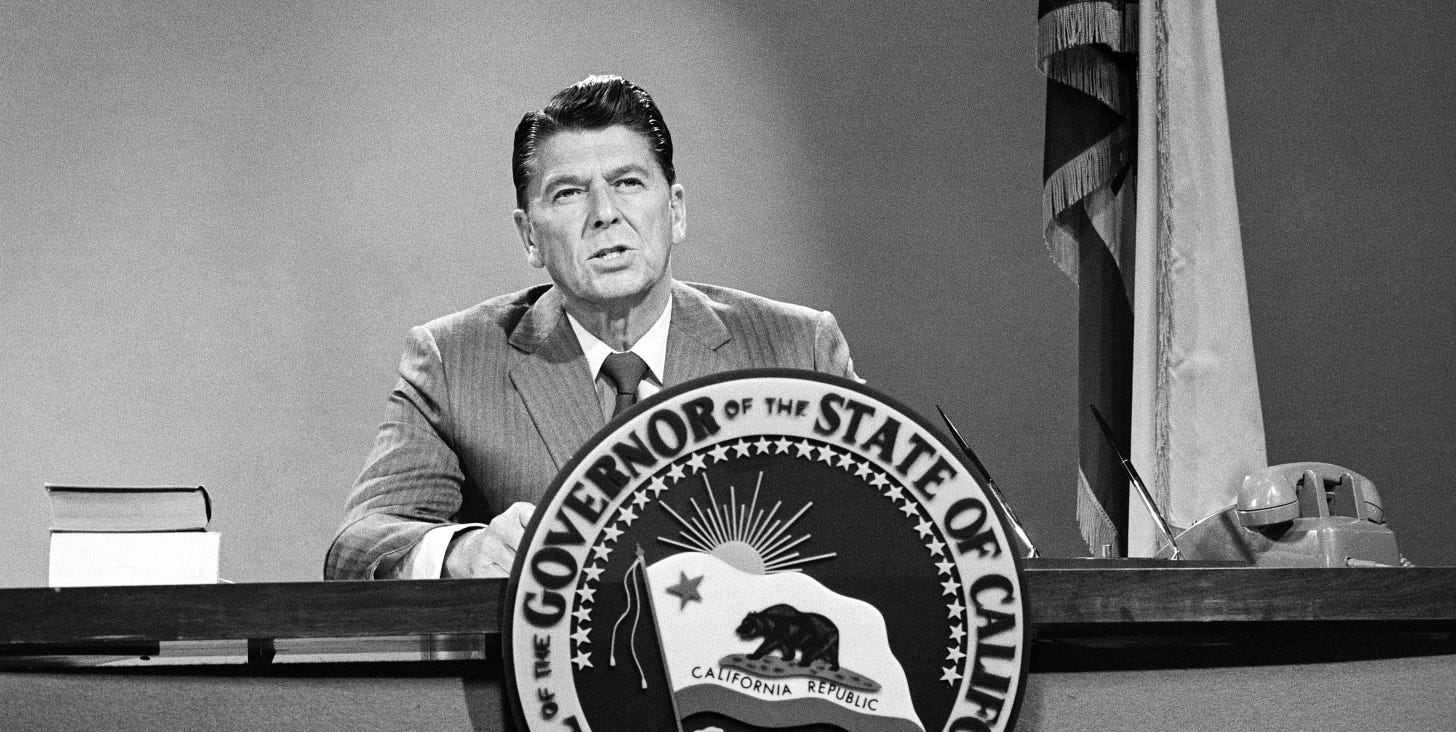Just a few months after his election as Governor of California, Ronald Reagan gave a speech to a Republican auxiliary club in Long Beach. It was in this speech that Reagan laid out his so-called “big tent” philosophy, which has subsequently been repeated by Republican politicians for more than a half century. This phrase has been used to justify moving the GOP to the left in order to attract more voters, but I contend that is a clear misinterpretation of what Reagan actually said.

First, Governor Reagan was acting from a position of political weakness. Despite his own election as governor, Republicans had failed to capture the Assembly or Senate, meaning he had to find a way to appeal to voters outside the GOP tent:
The 11th Commandment kept our party unified; but we were, and still are, a minority party. There is still much to be done in party building, in convincing independents and members of the opposing party that the course we chart leads to fiscal sanity, strong local government and individual rights and responsibilities.
This is not the situation we have in Idaho, where Republicans command an overwhelming majority. Here, there is less of a need to appeal to Democrats and independents than there is to make sure that our party sticks to its principles. According to the most recent numbers from the Secretary of State, just under 60% of registered voters in Idaho are Republicans. Nearly 83% of lawmakers in the 67th Idaho Legislature were Republicans. This is a very different situation than that of California in 1967.
Last November, millions of people voted to change, or at least pause to review, the philosophy of the party leadership now in power. They did not just decide to change hats and join the other club for a while.
Nowadays, it’s far too easy to simply “change hats”. A leftist progressive who decides the Democratic Party has gone too far can switch from Team Blue to Team Red, and many Republicans are ecstatic, seeing it as a win for conservative ideas. What most often happens, however, is that the new Republican works to move the party leftward toward his or her current position.
In the very same paragraph in which he extolled the big tent, Reagan warned against compromising your principles:
The Republican Party, both in this state and nationally, is a broad party. There is room in our tent for many views; indeed, the divergence of views is one of our strengths. Let no one, however, interpret this to mean compromise of basic philosophy or that we will be all things to all people for political expediency.
This is the crux of where I believe the two sides of the Idaho Republican Party err.
The left side, the moderates, believe that they really can be all things to all people. They often seem willing to abandon conservative policy positions in favor of leftist ideas, though they might appeal to very vague principles to justify it. Recall that former Arkansas governor Asa Hutchinson vetoed a bill to protect children from genital mutilation surgeries by saying that Republicans don’t get between families and doctors. That is a fundamentally dishonest application of Republican principles and shows that Hutchinson had adopted a left wing frame of reference.
When this group talks about the “big tent” they only ever want to expand it toward the left. I know many Idaho Republicans who will happily commingle with outright socialists or people who advocate for mutilating children, but would never be caught talking to someone on the right who has been labeled as a racist or extremist by corporate news media. These people would happily excise the right side of the party to garner positive coverage by the left wing media.
The right side, on the other hand, errs by continually trying to keep their side as small as possible. People on this side will often excommunicate their own for differences over strategy or for working with moderates on any issue. Unlike the left side of the party, which craves the approval of corporate news media, the right side relishes in its disapproval.
I often see figures on the bleeding edge of the right competing over who is most principled by taking ever more impossible positions. “Oh, you support Donald Trump? Don’t you know that he wants more legal immigration, raised the deficit, and refused to support a national abortion ban? I guess you’re not as conservative as you think.”
Reagan warned against this as well:
Within our tent, there will be many arguments and divisions over approach and method and even those we choose to implement our philosophy. Seldom, if ever, will we raise a cheer signifying unanimous approval of the decisions reached. But if our philosophy is to prevail, we must at least pledge unified support of the ultimate decision. Unity does not require unanimity of thought.
When you decide to engage in politics you must figure out for yourself the differences between principles and strategy. What do you want to accomplish, and what can do you to get there? Let’s say you want to abolish the income tax. What are you prepared to do to make it a reality? What compromises are you willing to accept? Would you accept a half a percent cut, knowing you can come back next session and cut it further? Or do you hold out for all or nothing?
The temptation on the left side of the GOP is to accept too little and give away too much. In the income tax example, if you trade a cut of one tenth of a percentage point in exchange for, say, a new welfare program, then you’ve been fleeced, and voters would do right to assume that you’re essentially working for the other side. Compromise cannot be an end unto itself.
On the other hand, the temptation on the right side of the party is to go all or nothing on every issue. It’s disingenuous to hold out for something that is extremely unlikely, such as complete abolition of the income tax in a single session, and then blame fellow Republicans for not getting it done. This side sees compromise as a dirty word, and would rather lose than give an inch. By all means set lofty goals — we need people with bold visions to show us what is possible — but you need to accomplish things too.
The purpose of politics is to make your principles into reality, and that is done by passing legislation and making policy. The same folks who have made not compromising a principle unto itself would be flabbergasted by the number of compromises our Founding Fathers made in the process of creating our country. Imagine if James Madison had held completely firm — all or nothing — on his desire for a unicameral legislature that was proportionally represented by the people. Instead, he was willing to compromise when the Connecticut delegates proposed a bicameral legislature instead, and this allowed the creation of a strong and resilient system of government.
When planning how to turn principles into policy, you must avoid both mistakes: don’t give away the farm because you mistakenly believe compromise is a goal unto itself, but neither should you eschew compromise to the point where you get nothing done.
I agree with Ronald Reagan. Within our tent we can have disagreements over strategy, tactics, and the methods we undertake to implement our policy, but we must first come together and agree on principles. Luckily, here in Idaho we have already done that: it’s called the Idaho Republican Party Platform. Let’s put our heads together to figure out the best way to implement those principles in the 2025 session and then get to work.
As a free subscriber to the Gem State Chronicle you receive daily articles in your inbox. Paid subscribers get bonus notes, early access, and exclusive content like last week’s special report on vice presidential nominee J.D. Vance. Click here to subscribe today!
About Brian Almon
Brian Almon is the Editor of the Gem State Chronicle. He also serves as Chairman of the District 14 Republican Party and is a trustee of the Eagle Public Library Board. He lives with his wife and five children in Eagle.













